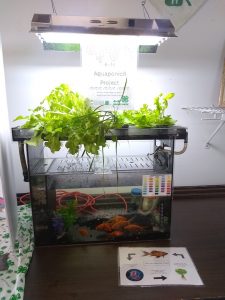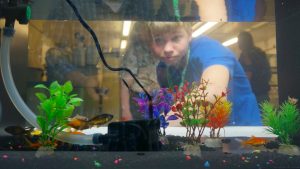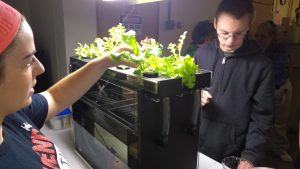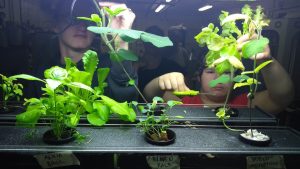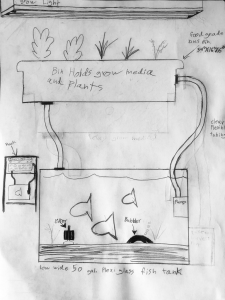4-H Aquaponics Project
University of Maine Cooperative Extension 4-H in partnership with the UMaine Center for Cooperative Aquaculture Research (CCAR) and the UMaine Aquaculture Research Institute (ARI) delivers the 4-H Aquaponics Project, a project-based learning experience for K-12 youth. The project is designed for K-12 youth and covers various aspects of aquaponics, including introductory systems and design, fish care and husbandry, aquaponic gardening, cooking, nutrition, and more. Participants develop valuable life skills such as record-keeping, problem-solving, food safety, collaboration, math, and science literacy.
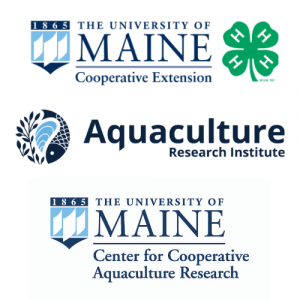
The project is open to educators and youth in both formal (classroom) and informal (summer camp, after-school, community) settings. Thanks to our generous sponsors, participation is entirely cost-free for educators in Maine.
What is Aquaponics?
Aquaponics is a unique farming method that combines raising fish in tanks (aquaculture) with growing plants without soil (hydroponics). In an aquaponics system, plants utilize nutrient-rich water from the fish tank, simultaneously purifying the water for the fish. This sustainable farming technique can be practiced year-round, indoors, and in any climate, making it a safe, easy, and fresh way to grow your own food. We believe aquaponics is an engaging hands-on platform for teaching STEM concepts related to aquaculture across various age groups.
- 4-H Aquaponics Tank
-
Youth Aquaculture Micro-credentials
- Lettuces, herbs, and leafy greens grow well in an aquaponics system
- The best part of harvesting aquaponic greens, no need to wash the dirt off!
- Aquaponics system design by 4-H youth in 2020
How to Participate
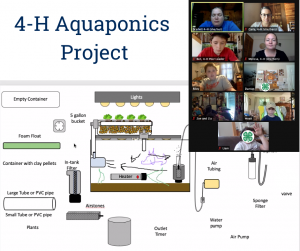
June 2021
The 4-H Aquaponics Project is open to educators and youth in both formal and informal learning environments, including K-12 classrooms, after-school programs, summer camps, and other group learning settings. Our expert team empowers educators to guide their learners through the process of designing, building, maintaining, and harvesting from a group aquaponics system of their own design. The program is flexible and self-paced, accommodating the needs and timelines of each group. It provides self-paced learning modules and expert mentorship, whether virtually or in person, as circumstances allow. No prior experience with aquaponics is necessary, and participation is open to individuals from any county in Maine.
Support and Expectations
In exchange for your participation, we provide the following support to address common challenges faced when maintaining tanks in educational spaces:
- All equipment is supplied at no cost, including fish and live plants/seeds.
- Learning modules and activities are included.
- Fish can be returned to us when care is not possible (e.g., during summer or winter breaks).
- We offer assistance with system setup and fish tank cycling, including site visits.
- Troubleshooting support is available for any equipment or fish health issues.
- Direct access to aquaculture experts and youth development professionals at UMaine.
In return, we ask participating educators to:
- Facilitate the project-based learning experience with their youth.
- Take responsibility for the care and maintenance of plants, animals, and equipment.
- Maintain frequent communication with us about needs, issues, and successes.
- Provide feedback on ways to improve the project.
- Return equipment when it is no longer in use.
- Report the number and demographics of youth participants reached through the project.
Aquaponics Learning Modules
Our curriculum includes the following modules:
- Intro to Aquaponics
- Aquaponic Systems
- Aquatic Cycling
- Healthy Aquatic Ecosystems
- Harvest
- Career Exploration
- Sustainability
Coming Soon: Water Quality Monitoring Systems and Virtual Field Trips!
FAQ
What ages or grades is this project designed for?
The Aquaponics Project is suitable for a wide range of ages. While our curriculum is designed for upper elementary/middle school age, it can be adapted to any age group. We offer support for customizing the curriculum to your specific learners. We have worked with kindergarten through high school educators through this project.
What learning environments are best suited for this project?
We welcome educators from diverse backgrounds, including formal classroom teachers and informal educators such as camp counselors, 4-H volunteers, librarians, and more. We will work with you to tailor the project to your learning environment and available time with your learners. That being said, the project works best in an environment where a 20-30 gallon fish tank can be placed securely indoors, with access to electricity and water (although it doesn’t need to be right next to the sink or water source). We also need a commitment from an adult to assume responsibility for the equipment, plants, and animals in the ecosystem. Participating educators are expected to facilitate the project activities with their learners with support from the project team.
I already have a fish tank in my educational setting. Can I use it for this project?
Absolutely! We frequently collaborate with educators who already have some basic equipment. We’ll assist in filling in any missing elements and guide you toward best practices for aquaponics fish and plant care.
How long does the project take?
The program’s duration is flexible and can be completed at your own pace. It can last for an entire school year or a shorter timeframe, depending on your group’s needs. Here is a typical timeline for reference:
Start of project, Month 1: Meet with the project team, do a site visit, set up the fish system (fish tank)
Months 2-4: Cycle fish tank, youth submit proposals for their aquaponics design, project team gives proposal feedback
Month 4: Add fish to tank, start to build the grow bed/plant system, sow seeds
Months 5-6: First harvest of produce
Month 6 and beyond: Run and maintain the aquaponic system
In the News
- Program to transform aquaculture education through hands-on and virtual experiences
- UMaine Extension receives $750,000 to boost aquaculture learning tools
- UMaine Extension 4-H, UMaine aquaculture research staff win national award (2021 Denise Miller National 4-H Innovator Award, presented annually by the National Association of Extension 4-H Youth Development Professionals)
- “Hooked On Aquaponics” UMaine Today Magazine
Interested?
4-H Aquaponics Interest Form
If you are interested in participating in the 4-H Aquaponics Program, please complete the form below, and we will contact you.
For more information contact: 4haquaponics@maine.edu
This work is supported by the USDA National Institute of Food and Agriculture
![]()
In complying with the letter and spirit of applicable laws and pursuing its own goals of diversity, the University of Maine System does not discriminate on the grounds of race, color, religion, sex, sexual orientation, transgender status, gender, gender identity or expression, ethnicity, national origin, citizenship status, familial status, ancestry, age, disability physical or mental, genetic information, or veterans or military status in employment, education, and all other programs and activities. The University provides reasonable accommodations to qualified individuals with disabilities upon request. The following person has been designated to handle inquiries regarding non-discrimination policies: Director of Equal Opportunity, 5713 Chadbourne Hall, Room 412, University of Maine, Orono, ME 04469-5713, 207.581.1226, TTY 711 (Maine Relay System).

